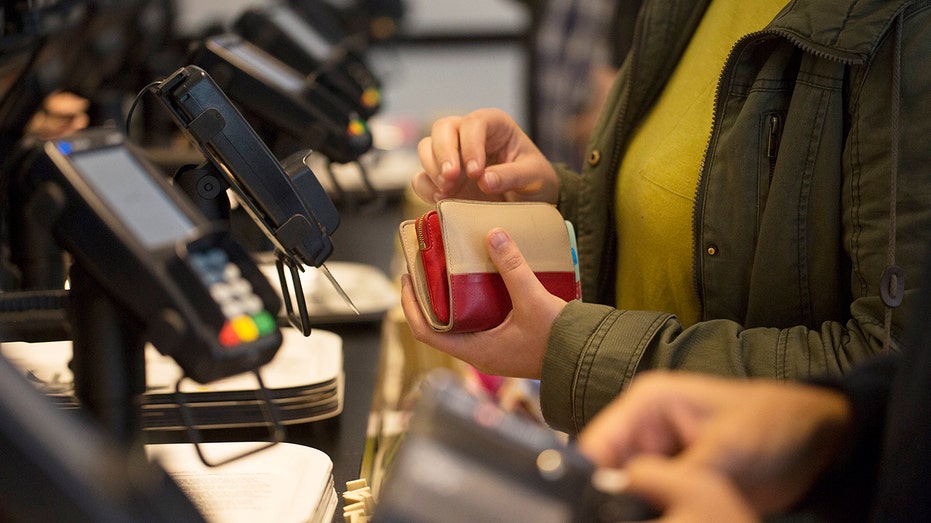Holiday shopping: Consumers lean on store credit cards to offset financial burden
Nearly 40% of consumers regret signing up for a store credit card, which carries higher than normal APRs
An increasing number of consumers are considering applying for store credit cards to try and offset the financial strain on their wallets during the upcoming holiday shopping season.
This year, 35% of Americans are likely to apply for such cards, up from 29% a year ago, according to recent data from LendingTree. This marked the second-highest percentage in the five years that LendingTree has tracked the data.
Matt Schulz, LendingTree's chief credit analyst, told FOX Business that the data is "fairly surprising" given the fact that "there have been reasons to kind of write the obituary for store credit cards in the last couple of years in the wake of the buy now, pay later phenomenon."
INFLATION TO DAMPEN HOLIDAY RETAIL SALES, DELOITTE SAYS

A customer holds her purse while making a purchase using a debit card via a Verifone Systems Inc. payment device at a restaurant in London, U.K., on Friday, May 22, 2015. (Simon Dawson/Bloomberg via Getty Images / Getty Images)
Buy now, pay later — which allows consumers to pay off purchases in interest-free installments — has eaten into credit card usage in the past, according to Schulz.
The recent interest in store credit cards "may speak to the fact that people are looking for a little more help to…extend their holiday budget and to be able to afford to do a little bit more in the wake of all the inflation," he added.
Still, LendingTree found that 37% of people who signed up for a store credit card in the past have regretted that decision. About 14% of them say this has happened to them several times, according to the data.
RETAIL TRADE GROUP SAYS SHOPPERS WILL LEAN ON SAVINGS AND CREDIT THROUGHOUT HOLIDAY SEASON
For one, these cards have always carried a higher APR compared to regular credit cards, and those rates are only getting worse. According to LendingTree data, the average new store card APR rose to 26.60% from 24.27% over the past year.
That's "significantly higher" than rates for all new credit card offers, which is about 22.21%, according to LendingTree.

Fan of plastic credit cards is in woman's hand. Bank's favorable offers for consumers concept (iStock / iStock)
The average new store card rate in 2022 is the highest since LendingTree began tracking the data in 2018.
ONLINE HOLIDAY SHOPPING SALES TO REACH $209.7B THIS YEAR: ADOBE
These cards will always have higher APRs because retailers want to make these cards available to all shoppers, according to Schulz.
"In order to make them available to everybody, they have to make the interest rate high to protect themselves and to manage their risk," he said.
These cards also typically have a single rate as opposed to a range.
"For regular credit cards, the vast majority have a range of most possible papers in order to be able to make sure that the person with an 800 credit score can get a lower rate while the person with a 600-650 credit score pays a higher rate," Schulz said.
GET FOX BUSINESS ON THE GO BY CLICKING HERE
These cards, unlike regular credit cards, "tend to appeal a lot to folks for whom their other choices are not so great," he added.
For instance, shoppers with damaged or no credit, may not be able to get other types of credit cards. These store cards are a way for those shoppers to build up their credit and then move on to other credit cards, Schulz said.





















